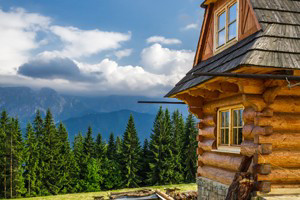- Get a backcountry camping permit at the Backcountry Office next to the Beaver Meadows Visitor Center or the Kawuneeche Visitor Center
- To avoid bears, take precautions with your food and garbage
- Hiking the East Inlet Trailhead within Rocky Mountain National Park takes you to many fabulous destinations
With 416 square miles of mountainous terrain, forest wilderness and 60 mountain peaks, Rocky Mountain National Park’s backcountry provides the outdoor enthusiast with a variety of elevations, flowing mountain waters, wildflowers abound and vast forestland to enjoy.
Backcountry Camping Areas
There are a number of places to explore when you go Rocky Mountain backpacking and camping. Below are only a very few!
East Inlet Trailhead
On the west side of Rocky Mountain National Park, you’ll find the East Inlet Trailhead at 8,390 feet. Many destinations await you from this trailhead, and some of them include Andrews Peak and Lake Verna. You can pick up the trail on the eastern shore of Grand Lake, opposite the boat launch.
North Inlet Trailhead
Head to the North Inlet Trailhead at Grand Lake, off of Highway 278, offering numerous trails to hike into the backcountry. Lake Nokoni is a favorite destination, a beautiful lake within a glacial bowl. It’s an 18.6-mile hike.
Fern Lake Trailhead
The east side of the park also has many trails, including the Fern Lake Trailhead with end points such as Fern Lake, Spruce Lake and many more. You can access this trailhead from Bear Lake Road in Moraine Park.
Longs Peak
In the Longs Peak area at 9,404 feet you’ll find the Longs Peak Trailhead with amazing views from Chasm View and other destinations such as Estes Cone and the Keyhole. You can get there by following Highway 7 and turning on Longs Peak Road about 9 miles south of Estes Park.
Moore Park Trail
One of the trails you should take is Moore Park, a beautiful meadow within the forest. The backcountry site is 1.7 miles from the Longs Peak Trailhead. With an elevation gain of only 360 feet, it’s an easy trail to hike.
Backcountry Permits
You will need a backcountry permit in order to camp overnight in the Rocky Mountain National Park wilderness. There are two places you can pick one up – at the Backcountry Office next to the Beaver Meadows Visitor Center or at the Kawuneeche Visitor Center. Day-Of Permits can be obtained in person all year, but you can make reservations in person or by mail for a calendar year by contacting: Backcountry/Wilderness Permits, Rocky Mountain National Park, 1000 Highway 36, Estes Park, CO 80517 or calling 970-586-1242.
When making a reservation, you’ll need to include your name, address and telephone, a full itinerary and the number of people going.
Cost of a permit is $20.
If you will be fishing, you’ll need a Colorado State fishing license, which you can purchase at local sporting goods stores in communities surrounding the park.
Bear Safety
There are black bears within Rocky Mountain National Park so you must take precautions with your food and garbage.
- Secure your food! You can purchase or rent a bear canister (required for all backcountry campsites) at sporting goods shops in Estes Park and Grand Lake.
- Always seal food scraps and garbage in airtight containers.
- Store all scented items such as deodorant, toothpaste and soap with your food.
- Keep a clean campsite and use proper sanitation. Other animals besides bears can destroy campsites when attracted by sweat or urine, looking for salt. This includes mountain lions, deer and bighorn sheep.
Rules & Regulations
Rules for backpacking Rocky Mountains’ trails and camping in the backcountry of Rocky Mountain National Park include the following:
- Display your permit on the outside of your pack when hiking and on your tent at the camping site.
- When there is no pit toilet at the campsite, be sure to urinate on rocky spots so animals won’t damage the landscape by digging in the area.
- Bury fecal waste at least 6 inches deep or pack it out.
- Always defecate 200 feet from water or trails. Also washing dishes or bathing within 200 feet of water sources is not permitted.
- Pack out all garbage.
- Only have fires when there are metal fire rings provided.
- Do not hunt, approach or feed wildlife.
Leave No Trace
- Plan Ahead and Prepare
- Travel and Camp on Durable Surfaces
- Dispose of Waste Properly
- Leave What You Find
- Minimize Campfire Impacts
- Respect Wildlife
- Be Considerate of Other Visitors






